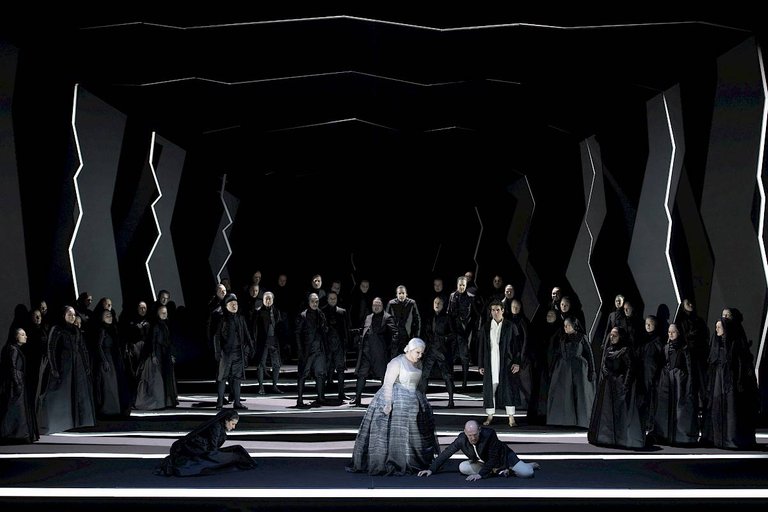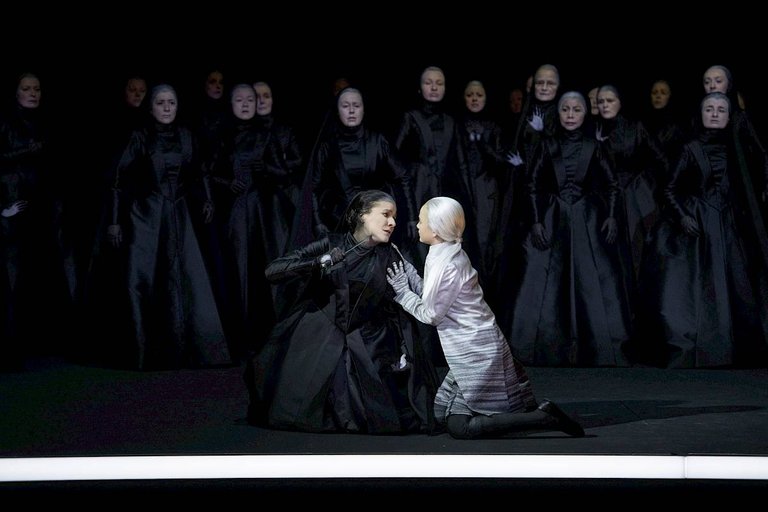Christoph Willibald Gluck's 4 Acts masterpiece still sounds much younger than its age 222 years after it was composed in 1779. This was the opera that completed Gluck's 'reform' of the Baroque ways of doing musical drama. The musical numbers are composed to convey the drama of the story rather than to show off the lead singers, and they are connected by short recitatives that are accompanied by the orchestra. If you like Gluck's Orphée et Eurydice, his Iphigénie en Tauride will be a real treat for you!
The Myth:
Stranded on the island of Aulide on his way to the Trojan War, Agamemnon sacrificed his daughter, Iphigénie, in return for favorable wind to get his fleet moving again. This set off a legendary circle of vengeful actions that gave rise to many plays and opera about the tragedy of the House of Atreus. Agamemnon is later murdered by his revenge-seeking wife, Clytemnestra, who is then murdered by her son, Oreste (with the help of his sister, Electra), who are then perpetually harassed by the nasty Greek-tormenting furies for the crime of matricide.
The Opera's Story:
The Greek poet, Euripides, thought up a different scenario in his play, Iphigenia in Tauris, however, where Iphigénie is saved from death on the island of Aulide by the goddess Diane (Diana), who then deposited her as her High Priestess on the Scythians' island of Tauris (Tauride) instead (not more tropical a place, but at least she gets to keep her head). Practically nobody that she knew were told about the rescue, however, and thought her dead... So Clytemnestra still went on to kill Agamemnon, and then got axed in return by Oreste.... who was chased by the furies until he and his pal, Pylade, ran their ship aground during a malevolent storm on Iphigénie’s new island home, fifteen years after the Aulide incident.
The opera opens with Iphigénie and the other priestesses of Diane praying in horror of the severity of the sea tempest. Our heroine revisits a particularly bad dream she had, depicting the murder of her father and mother, and her future murder of her brother. Her torment is not eased by the approach of Thoas, who hands her the assignment of making blood sacrifice of the two foreigners who were arrested at the beach. Even though they don’t recognize each other, the (by now) nearly thoroughly demented Oreste stirs a strong sense of kinship in Iphigénie (insanity is a rather common household condition in their family). She learns about the actual death of her parents (with a fake embellishment that Oreste had also killed himself after his matricide) from Oreste before sending him to the altar.
Resolving to save at least one of the two washed up Greeks, Iphigénie proposes to help Oreste escape (and only slay Pylade at the altar) if he would carry her letter to Electra (their sister, who, unlike the version of the myth told in Strauss' Elektra, is still alive) in Mycenae. Each of the two friends argue to be the one to stay and die in order to spare the other, but Oreste wins out when he threatens to commit suicide if Pylade doesn't give way. After having sent Pylade off safely, the very touched (in more than one way) Iphigénie finds it hard to go through with the sacrifice of Oreste... especially once their true identities were revealed to each other. The impatient Thoas rushes in to demand blood, but Pylade (who can never be accused of tardiness) arrives back with an army of Greek warriors just in time to rescue them and sends Thoas off to his new home in Hades. In a final touch, Diane herself appears to pardon Oreste’s crime and rids him of his pesky furies stalkers. And so the opera ends in a very un-Greek-Myth-ish fashion with a happy ending as the three Greeks sailing back home to Mycenae.
CAST:
Iphigénie ::: Juliette Galstian (soprano)
Oreste ::: Rodney Gilfry (baritone)
Pylade ::: Deon van der Walt (tenor)
Thoas ::: Anton Scharinger (baritone)
Diane ::: Martina Jankova (soprano)
William Christie/ Orchestra La Scintilla
Jürg Hämmerli/ Chorus of the Zurich Opera
Stage Director: Claus Guth
Video Director: Thomas Grimm
As is the case in most opera productions at the Zurich Opera, Klaus Guth's staging of Iphigénie en Tauride is not traditionally set (with Greek scenery and toga) but is of a minimalistic-modernistic conceptual style that focuses on the modified myth's psychological drama. It is imperative that you know the myth of the House of Atreus before you watch this thing, since characters that really have no place in this opera (like Agamemnon and Clytemnestra) are added as masked mimes, showing us that the characters that ARE in the opera (Iphigénie and Oreste) draw their motives from them. You should watch the extra feature where Klaus Guth, the stage director, explains the concepts he uses and tries to relate in this production before watching the opera itself. I also love the way he uses the chorus members' stylized choreography in place of traditionally dancing during the 'ballet' parts, since it keeps the focus on the drama/story of the opera instead of being a distraction. As a whole, this is a wonderfully effective staging that keeps the tension coursing through the performance, so even those of us who are averse to the 'Eurotrash' style shouldn’t find this repulsive.
Guth is blessed with an amazingly dramatically committed cast of acting-singers. The leading lady of the show is the riveting Juliette Galstian’s Iphigénie. This lustrously dark voiced Armenian soprano has a warm and very mezzo-like middle and lower range, and sings with a splendid sense of drama. She delivers a marvelously heart-rending Act II ending, Ô malheureuse Iphigénie, and transcendental in her plea to Diane ('Je t'implore et je tremble'). You can hear and see all the horrors and agonies her character endures through out the opera. Her high notes are a bit strained, but they don't distract in this dramatic manner of singing the role (though they do make me wonder if Galstian isn't really a high-mezzo rather than a soprano).
As the two friends are Rodney Gilfry as Oreste and Deon Van Der Walt as Pylade. Both are in good voice and act well. Gilfry's Oreste is truly tormented and weary, and Van Der Walt's Pylade is earnest and sympathetic. They have excellent chemistry and their Act III duet, Ah! mon ami, where each nobly volunteers to die in the place of the other is very movingly done without getting unbecomingly sugary. Anton Scharinger isn't exactly musically delightful as Thoas, but gives a convincing portrayal of the decidedly inhospitable monarch in his acting and during the scathingly disjointed aria, De noirs pressentiments. You could almost feel Thoas' paranoia diffusing out of the TV monitor!
All the minor roles are well performed, and the chorus of the Zurich Opera is simply wonderful! They are asked to act a lot, and they deliver all of it with aplomb. William Christie, a Baroque music specialist, delivers a clean and intense orchestral sound from Zurich Opera's utterly reliable Orchestra la Scintilla.
If you haven't discovered Gluck's operatic music before, this is a great start. The music is gripping from the start to the finish, and the marvelously lifelike stormy prelude that leads right into Iphigénie's first aria might even remind you of the totally demented rage of Elettra in Mozart's Idomeneo.



Congratulations @devoran! You have completed the following achievement on the Hive blockchain and have been rewarded with new badge(s) :
You can view your badges on your board and compare yourself to others in the Ranking
If you no longer want to receive notifications, reply to this comment with the word
STOPDo not miss the last post from @hivebuzz: